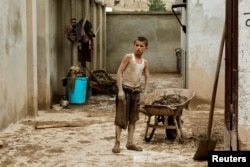Afghan officials said Sunday that the death toll from Friday’s flash floods in the northern Baghlan province had risen to at least 315, with more than 1,600 people injured.
The refugee ministry announced the latest casualties through social media platform X, formerly known as Twitter. It said more than 2,600 homes had been "completely and partially destroyed" in the province since the calamity hit following heavy seasonal rains.
The ministry stressed that it was reporting preliminary assessments from its Baghlan office, saying the financial and human losses could increase.
The United Nations World Food Program said Sunday on X that most of the affected areas in the province are "inaccessible by trucks," and it is using "every alternative," including donkeys, "to get food to the survivors who lost everything."
The International Organization for Migration supported the losses reported by the Afghan Taliban authorities, saying the death toll has exceeded 300 and that it expected the number to rise. The agency said the flood had destroyed more than 2,000 homes.
The IOM wrote on X, "We operate 16 warehouses throughout Afghanistan, and we are working with our partners to provide lifesaving aid to the affected people."
The spokesperson for U.N. Secretary-General Antonio Guterres quoted him as saying that he was saddened by the loss of life in flash floods in Baghlan and extended his condolences to the victims’ families.
"The United Nations and its partners in Afghanistan are coordinating with the de facto [Taliban] authorities to swiftly assess needs and provide emergency assistance," Stephane Dujarric said.
The United States said Sunday it was “deeply saddened” by reports of the many lives impacted by and lost to the devastating floods in Baghlan and several other Afghan provinces.
“Our implementing partners are mobilizing emergency relief including food, water, and other essential materials to communities in gravest need. Our thoughts are with those who’ve lost loved ones,” Thomas Wes, the U.S. special envoy for Afghanistan, said in a post on X.
Experts attribute the high seasonal rainfall in Baghlan and subsequent flooding to climate change, which caught an apparently unprepared administration and local residents off guard.
The deputy prime minister for economic affairs, Abdul Ghani Baradar, traveled to the province Sunday to oversee rescue operations, medical aid provision, emergency food distribution, and temporary shelter arrangements, his office said.
Poverty-stricken Afghanistan, reeling from years of conflict, is prone to natural disasters such as earthquakes, droughts, and floods. It is considered by the U.N. to be among the countries most vulnerable to climate change.
In mid-April, heavy rains and flash floods in 32 of the 34 Afghan provinces killed more than 100 people and destroyed nearly 1,000 homes. The calamity also destroyed 24,000 hectares of farmland in a country where 80% of the more than 40 million population depend on agriculture to survive.
Afghanistan’s economy collapsed after the Taliban seized power militarily in August 2021.
Aid groups say the Taliban-governed South Asian nation finds itself economically isolated, losing development funding that previously subsidized an estimated 75% of Afghanistan’s spending on public services.
International humanitarian aid for the country has significantly declined since the Taliban takeover even though the U.N. estimates over 15 million Afghans, or 35% of the population, suffer from crisis or worse levels of food insecurity.









